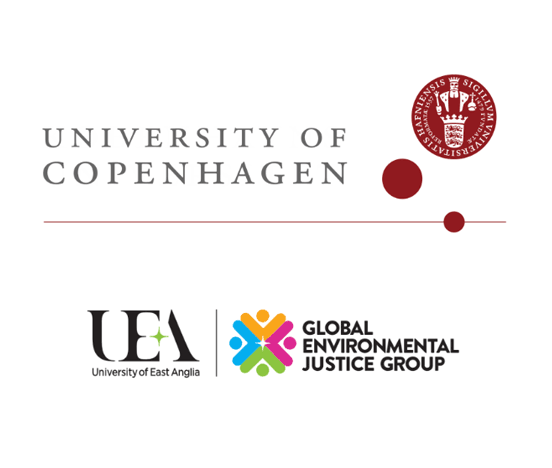In partnership with the University of Copenhagen and the University of East Anglia, the 4th Annual FLARE meeting will be held at the University of Copenhagen, October 17-20, 2018. The meeting will continue showcase presentations around a variety of key topics in the field, but will also offer a pointed opportunity to share and discuss our successes and failures in research and in practice.
FLARE 2018 Meeting Themes
Acknowledging Failure: Learning From Perverse Outcomes and Unintended Feedbacks
Often within research we are pressed to present our successes rather than our failures. This theme encourages transparent discussion on the failures we have all experienced: how they happened, what we did wrong, and especially, how we can learn from them. Failure can be categorized in different ways, such as perverse outcomes or unintended feedbacks. We hope that within this theme, researchers and practitioners can come together and share their knowledge and experiences to help improve the design and implementation of research, practice, and policy on forest management, in order to improve outcomes for forests and livelihoods.
Sharing Successes in Forest and Livelihood Research and Practice
Within this theme we offer the opportunity to present our successes both in research and/or in practice. These successes can be explored in a multitude of ways, for example through positive environmental outcomes (e.g. afforestation, forest restoration), through improving local livelihoods, or through achieving intended project outcomes. We invite conceptual, framing, modeling, and empirical work (including case studies and cross-case comparative studies) that highlight the role of forests in lifting people out of poverty and spurring broader economic growth (e.g. scaling up of small and medium forest enterprises, community-private sector partnerships, large-scale industrial development of based on forest products, new markets (e.g. for carbon credits) and earnings based on non-wood forest products and the like). Studies that highlight where forest reliance has improved people’s lives and livelihoods while conserving the natural resource base are especially valuable. This theme should bring together researchers and practitioners who hope to spread positive experiences / outcomes to help improve both forests and livelihoods. Abstracts that focus on solutions, successes, and lessons learned, are welcome.
Environmental Ethics, Equity, and Justice
Within this theme we call for research that explores environmental ethics, equity, and justice, in the context of forest livelihoods, natural resource management, and forest policies. This theme includes gendered and intersectional aspects of forest livelihoods. We hope this theme will encourage discussion about the messiness of what justice is in both research and policy, for instance by highlighting both competing claims and the tendency for outcomes to reflect elite interests. This theme may also shed light on how different claims to natural resources are cast as legitimate or not in the context of decision-making. Work that engages with aspects of inequitable / contested distribution of, for instance, natural and financial resources, and decision-making procedures, and that takes a historical and situated perspective to explain how domination and oppression in the context of distribution and procedures occur subtly and/or overtly, is particularly encouraged. This theme is crucial given that we often engage with individuals at the local level in rural contexts who have their own beliefs, customs, institutions, and needs. Within our own research agendas, we need to be aware if we are taking ethical, just, and equitable approaches for example through ensuring transparency in information.
Verification, Legality, Regulation, and Illegal Logging
Timber legality is a contemporary mechanism to address forest degradation, and to some extent, deforestation. Forest degradation and deforestation are global problems, closely related to climate change and threatening the lives and livelihoods of some two billion people in the next 35 years or so. However, there are many questions relating to (a) the links between legality and sustainability, (b) whose understandings of legality are legitimized and whose are not (and by whom), (c) how legality verification and regulations affect global markets and forests, and (d) how timber legality affects profits and livelihoods of different groups in society. This theme will explore these topics and elucidate issues of market, governance, livelihoods and power relations pertaining to the legal timber and wood products.
Linking Local Knowledge and Values with Practice and Research
Recent research has challenged how international development proponents define well-being, showing that the views of indigenous people, especially in rural and remote areas that are less dependent on cash economies, do not necessarily align with the international development agendas. Realizing this, some new initiatives aim to challenge conventional trajectories of development by centering around indigenous worldviews and developing local priorities directly with local peoples (e.g. biocultural conservation projects in the South Pacific, and ‘quality of life plans’ rooted in the Andean buen vivir ethos in the Andes-Amazon region). This theme calls for papers and presentations showing how these new approaches can shift the relationship between development agencies, conservation, and local well-being. Research should highlight (a) efforts to better engage local peoples and organizations involved in forest management and livelihood decision-making; (b) efforts to rigorously examine how these new approaches to conservation have genuinely departed from conventional integrated conservation and development projects; and/or (c) research that interrogates these distinctions. In addition, conversations about the methods that would be most appropriate to study these interventions are encouraged.
Forests in the Context of Rural-Urban Transformations
Rapid urbanization is connected to forests, livelihoods, and well-being through direct and indirect pathways. Rural forests and conservation areas are increasingly important for, and transformed by, growing urban populations. Migration patterns and the rise of an increasingly urbanized middle class in the Global South represents a shift in demographic patterns and consumption habits that will influence global forests and forest proximate peoples. This theme calls for research that examines both the direct and indirect influence of urban land and populations on forests and forest related livelihood and well-being. Work submitted under this theme could also address tensions between urban and rural populations, and between these populations and industrial-scale uses/users, as relationships and dependencies on forest resources change.
Beyond the Household: Measuring the Impacts of Forest Change on Communities, Economies, and Ecologies
Changing forest conditions have diverse and nested impacts on human and natural systems. However, quantitative studies that assess these impacts often rely on combining household surveys with remotely sensed land-cover data to generate acyclical (i.e. unidirectional) impact estimates. This theme encourages research that goes “beyond the household” by (a) using data collection and analytical techniques that quantitatively assess impacts across scales to focus on how forest cover change influences communities, economies, and ecological outcomes; (b) using household and remotely sensed land cover data to provide inter-scalar insights into community, economic, and ecological impacts from forest cover change; or (c) analyzing feedbacks in coupled human-natural systems.
Forests and the SDGs
This theme focuses on the relationship between the Sustainable Development Goals and forest-related livelihoods. While forests contribute directly to many of the SDGs, whether and how these goals, and their associated targets, are achieved remains a challenge. Abstract submissions should review the two-way relationships between the SDGs and forest livelihoods by examining, for example (a) how actions to sustain and improve rural, forest-related livelihoods contribute to the SDGs (even when such actions are not directly related to the SDGs), or (b) cases where governments and development initiatives actually undermine the livelihoods of forest-proximate peoples. Contributions should review the available evidence (and could also comment on data gaps, if relevant) on the subject and suggest key SDG indicators that can be used to monitor changes in forest-related livelihoods. Submissions could also speak to the challenges of enforcement and accountability (whether at local, regional, national, or global scales) in such monitoring and assessing endeavors. This theme especially seeks contributions related to SDG 13, climate action, inviting research on climate change related events (severe storms, droughts, and forest fires) and how they affect forest livelihoods. Research on how best to prepare local human populations and manage forest resources and livelihood activities to improve climate change resilience and adaptation is welcome.
Forest Policy Mixes: Trade-Offs and Synergies Between Forest Management Institutions
The past decade has seen major advances in our ability assess the outcomes of specific forest-based interventions. However, these advances have not yet addressed the benefits and drawbacks of different forest governance mixes. Forest policy mixes refer to the coordination and combination of different governance arrangements that unfold spatially, across forest landscapes. Thus, this theme moves away from reductionist approaches that seek to isolate individual impacts, to understand how forest policy is coordinated as well as implemented, and with what outcomes. At the last FLARE meeting, an emergent consensus was that lack of coordination between actors and sectors is a problem for forest governance. This year, we encourage papers that interrogate why such coordination failures occur, with particular attention to the politics that undergird coordination. Research that considers how and when coordination between political actors occurs; the implementation of forest governance across scale and space; or the outcomes generated from particular forest policy mixes are encouraged to submit their work to this theme.
Venue Information
Faculty of Science, University of Copenhagen, Frederiksberg Campus, Thorvaldsensvej 40, 1870 Frederiksberg
Overview of Program
Wednesday, October 17
Timber Legality Research Symposium (Thorvaldsensvej 40)
Joint TLRS-FLARE Reception 6:30pm (Thorvaldsensvej 40, Marble Hall)
Thursday, October 18
Parallel panel sessions 9:00am – 5:00pm (Thorvaldsensvej 40)
Friday, October 19
Parallel panel sessions 9:00am – 5:30pm (Thorvaldsensvej 40)
Optional boat cruise 6:30pm (Copenhagen Harbor) and conference dinner 7:30 (The Royal Danish Playhouse/Skuespilhuset)
Saturday, October 20
Optional workshops
Coordination Committee
Arun Agrawal, University of Michigan
Dan Brockington, University of Sheffield
J.T Erbaugh, University of Michigan
Madeleine Fogde, Stockholm Environment Institute
Malin Gustafsson, University of Gothenburg
Reem Hajjar, Oregon State University
Christian Pilegaard Hansen, University of Copenhagen
Jordi Honey-Roses, University of British Columbia
Suhyun Jung, University of Michigan
Allison Kelly, University of Michigan
Chuan Liao, University of Michigan
Wenman Liu, University of Michigan
Jens Friis Lund, University of Copenhagen
Francescsa McGrath, University of Michigan
Rodd Myers, University of East Anglia
Iben Nathan, University of Copenhagen
Pete Newton, University of Colorado at Boulder
Johan Oldekop, University of Sheffield
Laura Rasmussen, University of Copenhagen
Ashwin Ravikumar, Amherst College
Rebecca Rutt, University of East Anglia
Ingrid Stjernquist, Stockholm University
Jonathan Sullivan, University of Michigan
Cristy Watkins, University of Michigan
Sarah Wilson, University of Michigan
Jennifer Zavaleta, University of Michigan
Scientific Committee
Krister Andersson, University of Colorado at Boulder
Christopher Barrett, Cornell University
Tony Bebbington, Clark University
Rosina Bierbaum, University of Michigan
Guillermo Castilleja, Moore Foundation
Robin Chazdon, University of Connecticut
Stanley Dinsi, Network For Environment and Sustainable Development-Cameroon
Michael Dove, Yale University
Nicole Gross-Camp, Allegheny College
Paul Ferraro, Johns Hopkins University
David Kaimowitz, Ford Foundation
Eric Lambin, Stanford University
Adrian Martin, University of East Anglia
Jan McAlpine, International Consultant
Arthur Mugisha, AIMM Green, Uganda
Tuyeni Mwampamba, UNAM CIEco
Harini Nagendra, Azim Premji University
Robert Nasi. CIFOR
Jesse Ribot, UIUC
Sven Wunder, CIFOR

